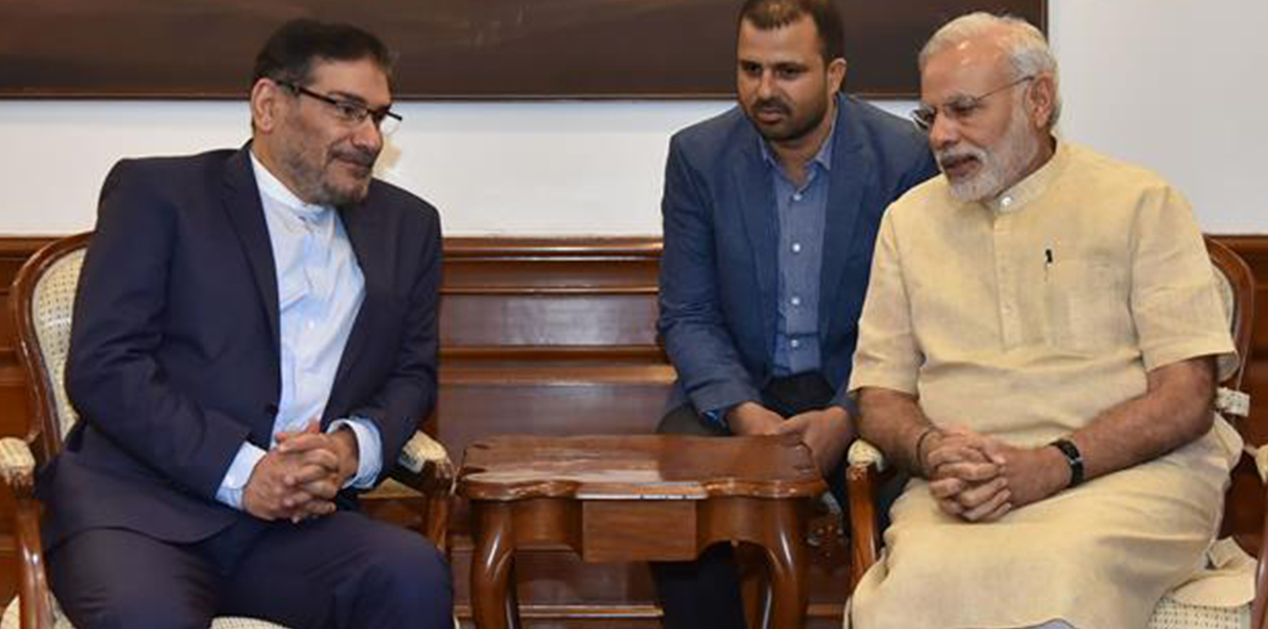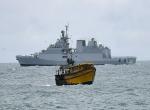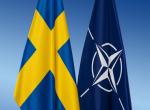In what could be considered as a new fervour in the Indo-Iranian ties, both the countries are now likely to revive their military-security cooperation. This will add importance to the relationship which, for several years, has been based mostly on oil and energy trade due to the United States (US)-led sanctions. Although engagement in military spheres is not a new phenomenon, activities in this field came to a standstill from the mid-2000s due to certain external factors. For little more than a decade, Indo-Iranian military ties have been shelved and became dormant.
Earlier, New Delhi and Tehran forged a considerable military cooperation, and it gained significance when a strategic partnership accord was signed during the visit of the then Iranian President Mohammad Khatami to New Delhi in January 2003. One of the agreements even granted New Delhi access to Iranian bases in exchange for various Indian defense products, training and technologies. As a follow-up to this, Indian naval and logistics specialists visited Iran and offered assistance on submarine maintenance and overhaul and tanks upgrades, and proposed the sale of Indian air defense equipment and airborne platforms. However, the bilateral relations between the two, let alone military cooperation began to simmer down, particularly after the 2005 Indo-US nuclear agreement. Israel, too, had their own concerns over the defense ties between its regional arch-rival and India and this also impacted, to some extent, the Indo-Iranian military cooperation.
While intermittent discussions between the Indian and Iranian military-security officials began during mid-2013, the thawing of Iran-US relations since November 2013 opened further prospects for the renewal of cooperation in this area. Iranian envoy Gholamreza Ansari’s desire to deepen defence/security ties with India is well known and he has been pushing for this even before the present Bharatiya Janata Party (BJP)-led government came to power in May 2014.1 In early December 2013, two Iranian warships, Alborz, Bandar Abbas, and Russian-origin Kilo-class submarine Younes, paid “goodwill” visits to Mumbai, and officials of both the countries discussed means to strengthen maritime cooperation, including safeguarding sea-borne trade and piracy. Notwithstanding the impact of the sanctions on the Iranian economy, its armament industries, to an extent, withstood the embargo and went ahead with defence industrialisation programmes. Simultaneously, as India has emerged as the largest importer of arms, several weapons manufacturing countries want to tap and benefit from the lucrative defence markets and Iran would definitely like to export some of its items whenever possible. Weapons systems such as ground surveillance radar systems, personnel carriers, drones, destroyers, submarines, and missile-launching frigates are widely manufactured in Iran.
Owing to the prolonged absence of military ties, it will take some time for both the countries to start trade in military items. While this is a prospective area of cooperation, it, at the same time, appears to be a contentious matter. This is considering the nature of India’s current state of relations with the US and Israel. Undoubtedly, Israel is closely monitoring the trajectory in which India-Iran relations are going, and will likely raise its concerns if the latter two countries begin to cooperate in this sensitive sphere. Objections might be raised should there be any transfer of military hardware/technology, particularly from the Indian side, sooner or later. On a similar note, the US, despite the Geneva-2015 nuclear deal, does not see eye-to-eye with Iran on some issues and intermittent confrontation at sea are taking place. Moreover, the US and Indian governments are striving tirelessly to enhance their defence cooperation, including technology transfers. As a result, Washington will remain cautious regarding any burgeoning military cooperation between Tehran and New Delhi.
Under the prevailing circumstances, the Indo-Iranian military-security cooperation is undergoing a gradual process of renewal but it is likely to be a restricted one for the time being. In other words, the nature of their engagement is going to be concentrated more on naval exercises, exchange of information and intelligence gathering, military training, anti-piracy and counter-terrorism cooperation. For the first time after the international sanctions were lifted from Iran in January 2016, navies from both the countries conducted exercises in early June in the Strait of Hormuz.2 In August 2015, too, an Indian naval delegation paid a five-day visit to Bandar-e-Abbas port and interacted with their Iranian counterparts, including exercises at sea.3 With objectives to play constructive roles in the war-ravaged Afghanistan, enhancing security cooperation has become imperative for India and Iran. Likewise, the Chabahar port development programmes require a considerable cooperation in security spheres so as to ensure a successful completion of the project and for the smooth conduct of trade and commercial transactions with the Central Asian Republics (CARs).
Counterterrorism is another area where Indo-Iranian security cooperation is getting a significant attention from both the governments. This is largely due to the ongoing politico-security crisis, particularly in West Asia and Afghanistan, and South Asia, where terror groups such as Daesh have penetrated in different forms—physically and ideologically. In almost all the high-level interactions between Iranian and Indian leaderships, discussions on how to fight this global phenomenon remained one of the top agendas. Owing to this, counterterrorism is emerging as a salient feature of the ties between the two countries. In the words of Prime Minister Narendra Modi during his visit to Tehran in May this year:
“We also have shared concerns at the spread of forces of instability, radicalism and terror in our region. We have agreed to consult closely and regularly on combating threats of terrorism, radicalism, drug trafficking and cyber crime. We have also agreed to enhance interaction between our defence and security institutions on regional and maritime security”.4
Similarly, Iranian Foreign Minister Javad Zarif, during his visit to New Delhi in mid-August, mentioned about a “new threat” in Afghanistan from Daesh. He categorically mentioned about the cooperation which is being sought by his country from India in tackling the menace of extremism and terrorism in the wider region. The recently-concluded visit of the Iranian Supreme National Security Council (SNSC), Ali Shamkhani, could be considered a move to bolster security-related cooperation with India.
That discussions on security issues, alongside enhancement of connectivity and oil-energy trade, have appeared prominently during these visits clearly signalled the appetite of both the countries to take the bilateral cooperation to new heights. Moreover, with Iran opening up to international community after the sanctions were lifted, India is taking this opportune moment to raise its level of cooperation with this strategically located nation. Furthermore, given the fast-changing security dynamics and emerging threats from non-state actors, it is timely that India and Iran are taking certain measures to renew their security cooperation. Keeping in mind the national interests, India should not let its overtures towards Iran be dictated by its relations with a third party. Its outreach to different countries (including Iran) is according to geopolitical/geostrategic importance. Warming up to Iran should not be seen in isolation as India is simultaneously expanding its security cooperation with other Persian Gulf Countries, too. Tellingly, New Delhi is exercising its strategic autonomy in West Asia and it is not at the cost of it relations with other nations in the region. It is in this interest that security cooperation has been given significant importance.
Endnotes
- “Iran seeks enhanced defence ties with India”, The Times of India, 22 July 2013.
- “Iran, India hold first joint naval exercise since lifting of international sanctions”, Defence News, 31 May 2016.
- “Two Indian Naval Ships Visit Iran”, Press Information Bureau, 28 August 2015.
- “Media Statement by Prime Minister during his visit to Iran”, Press Release, Ministry of External Affairs, 23 May 2016.
Published Date: 7th September 2016, Image Source: http://www.presstv.ir
(Disclaimer: The views and opinions expressed in this article are those of the author and do not necessarily reflect the official policy or position of the Vivekananda International Foundation)











Post new comment